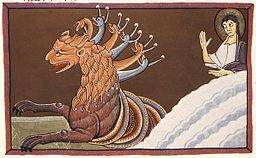 Why the Quest for a Name Is the Wrong Quest
Why the Quest for a Name Is the Wrong Quest
Revelation 13:18 encourages the wise to calculate or decode the number of the Beast. Many translations mislead the reader to search for a specific person whose name fits with 666. Regarding 666, these translations say, “it is the number of a man.” That is not the only possible translation (see my next post on 666). This quest for a specific person is misguided, if the Beast is not a man at all. If the Beast is an evil divine being, the second member of the Devil’s unholy trinity, and the great Antichrist, then he is more than simply a man, even a man who makes blasphemous, divine claims for himself (see my commentary on Rev. 13:8). Thus, even if one could make the number of the Beast point to the name of a Roman Emperor or several emperors, it is unlikely that one has solved the riddle of the Beast’s number. Since the first century, interpreters have come up with a whole list of names whose number can add up to 666. Those who say that 666 points to Nero are appealing to a solution that became popular after 1831. At that time, several scholars noted that a particular Hebrew transliteration of “Nero Caesar” (i.e., from Greek letters to Hebrews letters) adds up to 666. We also have manuscript evidence for an alternative number, 616. It may point to a different emperor, Gaius Caesar or Caligula (Bauckham, Climax of Prophecy, 387).
 Irenaeus’s Comments on the Quest for a Specific Name
Irenaeus’s Comments on the Quest for a Specific Name
The church father, Irenaeus (2nd century Church Father from Asia Minor), counsels people to stop trying to figure out the name that corresponds to 666. He suggests that many names can fit, so it is better to wait and see who the fulfillment will be than to speculate (Against Heresies, 5.30.3). He says, “It is therefore more certain, and less hazardous, to await the fulfilment of the prophecy, than to be making surmises, and casting about for any names that may present themselves, inasmuch as many names can be found possessing the number mentioned” (Ante-Nicene Fathers). He goes on to provide “Lateinos” as an option. He claims that “Lateinos” could be equivalent to 666 and would refer to the “Latins” (that is, the Romans). Ireneaus sees this as a possible name, since he thinks that the Romans are the fourth kingdom that arises in Daniel 7.
Gematria: Turning Numbers into Names
The reader can be forgiven for wondering about this practice of turning numbers into names. In John’s time, pagans and Jews had a system for equating letters and numbers that allowed one to provide the numerical value of a word or name. In Jewish circles, this practice is called gematria. One sees this practice in other works from around John’s time. For instance, one learns that the “reckoning” or “calculation” of a Greek spelling of the name Emmanuel yields the number 684 (Testament of Solomon 15:11; Bauckham, Climax of Prophecy, 385).
Given the practice of gematria and the phrase “it is the number of a man,” one can see why interpreters are trying to find a specific man’s name. They are trying to carry out John’s command to “calculate” or “reckon” the “number of the Beast” (13:18). If, as seen above, it is unlikely that the Beast’s number corresponds to a man’s name, then perhaps there is a problem with the translation “it is the number of a man.” We will look at an alternative translation and understanding of 666 in an upcoming post.
Sources:
These paragraphs are slightly edited portions of my book:
Paul Hoskins, The Book of Revelation: A Theological and Exegetical Commentary, pp. 256-257 (those pages provide further sources and footnotes that I have omitted above).
